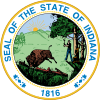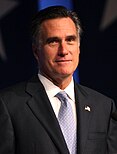
Each of the 50 U.S. states, the District of Columbia, and five territories of the United States holds either primary elections or caucuses to help nominate individual candidates for president of the United States. This process is designed to choose the candidates that will represent their political parties in the general election.

Presidential elections were held in the United States on November 4, 2008. The Democratic ticket of Barack Obama, the junior senator from Illinois, and Joe Biden, the senior senator from Delaware, defeated the Republican ticket of John McCain, the senior senator from Arizona, and Sarah Palin, the governor of Alaska. Obama became the first African American to be elected to the presidency. This was the first election since 1952 in which neither the incumbent president nor vice president was on the ballot, as well as the first election since 1928 in which neither ran for the nomination.

From January 3 to June 3, 2008, voters of the Republican Party chose their nominee for president in the 2008 United States presidential election. Senator John McCain of Arizona was selected as the nominee through a series of primary elections and caucuses culminating in the 2008 Republican National Convention held from Monday, September 1, through Thursday, September 4, 2008, in Saint Paul, Minnesota. President George W. Bush was ineligible to be elected to a third term due to the term limits established by the 22nd Amendment.
This article contains the results of the 2008 Republican presidential primaries and caucuses.

The 2008 United States presidential election in Iowa took place on November 4, 2008, as part of the 2008 United States presidential election. Voters chose seven representatives, or electors to the Electoral College, who voted for president and vice president.

The 2008 Nevada Republican presidential caucuses was held on January 19, the same day as the 2008 South Carolina Republican primary, with 31 delegates at stake. Mitt Romney was the winner in Nevada with 51% of the votes, with Ron Paul in second place. Half of Romney's votes came from Mormons, while two-thirds of the independent voters favored Paul. According to the Las Vegas Sun, Republicans crossed over in large numbers to vote Democratic; CNN exit polls indicated that Republican voters made up 4% of the Democratic caucus turnout.

The 2008 Louisiana Republican presidential caucuses were held on January 22 and the primary on February 9, 2008.

The 2008 United States presidential election in California took place on November 4, 2008, in California as part of the 2008 United States presidential election. Voters chose 55 electors, the most out of any of the 50 states, to the Electoral College, who voted for president and vice president.

The 2008 West Virginia Republican presidential caucuses took place on February 5, 2008, to select 18 delegates to the 2008 Republican National Convention. An additional nine delegates were selected in a primary election on May 13, 2008, for a total of 27 delegates to the national convention. Mike Huckabee won the caucus, and John McCain later won the primary.

The 2008 Pennsylvania Republican presidential primary was an election held on April 22 by the Pennsylvania Department of State in which voters chose their preference for the Republican Party's candidate for the 2008 United States presidential election. Voters also chose the Pennsylvania Republican Party's candidates for various state and local offices.
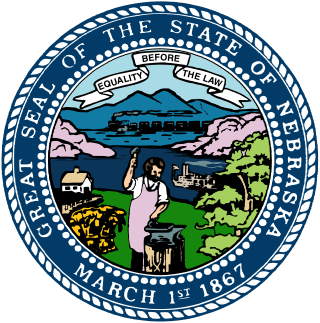
The 2008 Nebraska Republican presidential primary took place on May 13, 2008. John McCain won the primary, although he had secured his party's nomination weeks before the election through his performance in earlier primary contests.
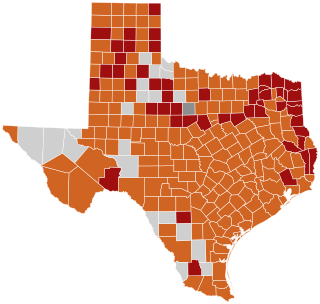
The 2008 Texas Republican presidential primary took place on March 4, 2008. John McCain won the primary election, giving him enough delegate votes to guarantee his nomination at the 2008 Republican National Convention.
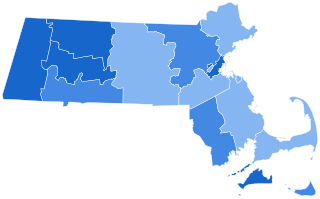
The 2008 United States presidential election in Massachusetts took place, as in all 50 states and D.C., as part of the 2008 United States presidential election of November 4, 2008. Voters chose 12 representatives, or electors to the Electoral College, who, in turn, voted for the office of president and vice president.

Super Tuesday II, 2008 is the name, for 4 March 2008 the day on which the second largest simultaneous number of state presidential primary elections was held for the 2008 presidential election cycle. On this day, Mike Huckabee withdrew from the race when John McCain won enough delegates to claim the Republican nomination for president. It was the second Super Tuesday election of 2008 and took place approximately one month after the first Super Tuesday of this election. The Democratic primaries saw 444 delegates selected on this date, with 265 delegates in the Republican primaries.

The 2008 United States presidential election in Washington took place on November 4, 2008, and was part of the 2008 United States presidential election. Voters chose 11 representatives, or electors to the Electoral College, who voted for president and vice president.

The 2008 United States presidential election in Pennsylvania was part of the 2008 United States presidential election, which took place on November 4, 2008, throughout all 50 states and the District of Columbia. Voters chose 21 representatives, or electors to the Electoral College, who voted for president and vice president.

In 2008, Virginia, for the first time since 1964, cast its electoral college presidential votes for a Democrat, Barack Obama. It also elected a United States senator, members of the United States House of Representatives, and local officers such as county board and school board members.

The 2012 United States presidential election in Louisiana took place on November 6, 2012, as part of the 2012 United States presidential election in which all 50 states plus the District of Columbia participated. Louisiana voters chose eight electors to represent them in the Electoral College via a popular vote pitting incumbent Democratic President Barack Obama and his running mate, Vice President Joe Biden, against Republican challenger and former Massachusetts Governor Mitt Romney and his running mate, Congressman Paul Ryan.

The 2012 United States presidential election in Montana took place on November 6, 2012, as part of the 2012 United States presidential election in which all 50 states plus the District of Columbia participated. Montana voters chose three electors to represent them in the Electoral College via a popular vote pitting incumbent Democratic President Barack Obama and his running mate, Vice President Joe Biden, against Republican challenger and former Massachusetts Governor Mitt Romney and his running mate, Congressman Paul Ryan.

The 2008 United States presidential election in New Hampshire took place on November 4, 2008, as part of the 2008 United States presidential election throughout all 50 states and the District of Columbia. Voters chose four representatives, or electors to the Electoral College, who voted for president and vice president.

